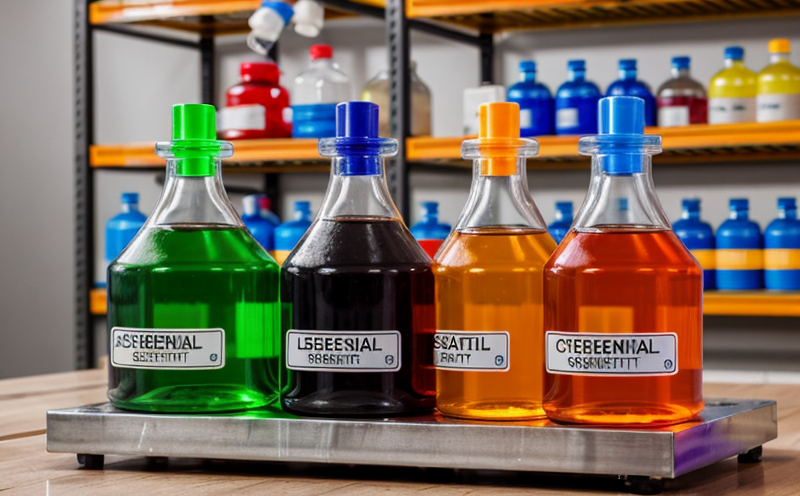Fragrance Allergen Testing in Consumer Goods
Understanding and managing fragrance allergens is critical to ensuring product safety and compliance with global regulations. The increasing diversity of fragrances used across consumer goods presents a unique challenge for manufacturers, quality managers, and compliance officers. This service focuses on identifying potential allergens within fragrance formulations that are commonly found in personal care products, textiles, and home goods.
The complexity of fragrance ingredients stems from their synthetic nature and the vast number of compounds used to create pleasant scents. Not all fragrances are allergenic, but certain chemicals can trigger allergic reactions or irritation when they come into contact with skin or mucous membranes. The European Union (EU) has classified several allergens under its Cosmetics Regulation (EC 1272/2006), and similar regulations apply in other regions like the United States and China.
Our laboratory employs rigorous testing protocols to identify these restricted substances, ensuring that products meet stringent regulatory requirements. By leveraging advanced analytical techniques such as Gas Chromatography-Mass Spectrometry (GC-MS) and High Performance Liquid Chromatography (HPLC), we can pinpoint the presence of known allergens with high accuracy.
The process begins with thorough formulation analysis, where our chemists meticulously examine each ingredient to determine its potential for causing allergic reactions. Once identified, these components undergo targeted testing using validated methods that align with international standards such as ISO 16429:2018 and ASTM F357-19.
Our approach also encompasses comprehensive quality control measures throughout the supply chain to ensure consistent results. This includes working closely with suppliers to source materials free from restricted substances, validating manufacturing processes, and conducting periodic audits of production facilities. By doing so, we help our clients maintain a high standard of product safety while minimizing risks associated with allergens.
The importance of this service cannot be overstated given the growing awareness among consumers about ingredient transparency and health concerns related to synthetic chemicals. Companies that prioritize testing for fragrance allergens not only enhance their reputation but also protect themselves against potential legal actions and recalls due to non-compliance issues.
Scope and Methodology
| Step | Action | Description |
|---|---|---|
| 1 | Formulation Analysis | A detailed examination of all ingredients used in the fragrance formulation to identify potential allergens. |
| 2 | Sample Preparation | If necessary, the sample is prepared for analysis using appropriate techniques such as dilution or extraction. |
| 3 | Analytical Testing | Using GC-MS and HPLC, specific allergens are detected based on their unique chemical signatures. |
| 4 | Data Interpretation | The results from the analytical tests are interpreted to determine compliance with relevant regulations. |
| 5 | Reporting and Compliance | A detailed report is generated outlining findings, recommendations for improvement, and compliance status. |
Benefits
Conducting fragrance allergen testing offers numerous advantages to manufacturers and distributors of consumer goods. Firstly, it helps ensure that products meet stringent regulatory standards set by various jurisdictions around the world. This is particularly important in markets like Europe where there are specific directives regarding restricted substances.
Secondly, by identifying potential allergens early in the development process, companies can make informed decisions about ingredient substitutions or reformulations to avoid non-compliance risks. Such proactive measures not only reduce the likelihood of costly recalls but also enhance brand reputation through responsible stewardship.
Furthermore, our testing services provide valuable insights into how different components interact within a fragrance formulation, which aids in optimizing product performance while maintaining safety levels. This knowledge can lead to innovations that improve both efficacy and user experience without compromising on health and safety considerations.
Finally, participating in regular testing ensures ongoing compliance even as regulations evolve or new allergens are added to lists. Staying ahead of these changes is crucial for maintaining market access across international borders while meeting local preferences and expectations.
Customer Impact and Satisfaction
Our clients benefit significantly from our fragrance allergen testing services, which contribute directly to enhancing product safety and regulatory compliance. Customer satisfaction is paramount in this industry, and meeting or exceeding expectations sets us apart from competitors.
We understand that maintaining high standards of quality requires continuous effort and vigilance. Our comprehensive approach ensures that every step of the process—from initial consultation through final reporting—is conducted with precision and attention to detail. This commitment translates into reliable results that instill confidence in our clients' ability to meet regulatory requirements confidently.
Moreover, we offer personalized support tailored to each customer's unique needs, whether it involves selecting appropriate tests based on product type or providing guidance on best practices for minimizing allergen risk during formulation and production. By fostering strong partnerships built on mutual trust and respect, we aim to create long-term relationships characterized by repeat business and referrals.
Ultimately, our goal is to empower our clients with the knowledge they need to make informed decisions that balance innovation with responsibility. Through transparent communication and collaborative problem-solving, we strive to exceed expectations while contributing positively to societal well-being.





